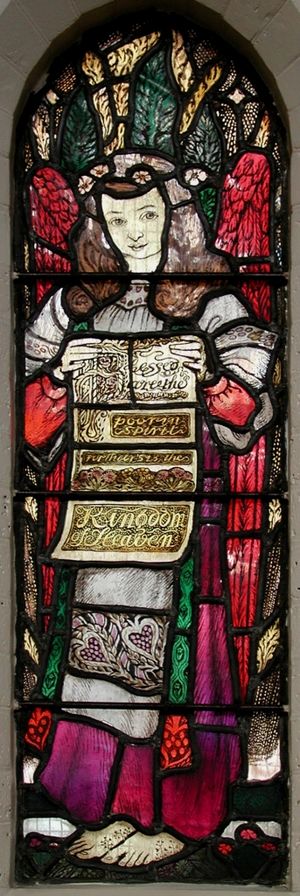Kingship and kingdom of God facts for kids

The idea of God being a King is found in many religions, especially those that believe in one God, like Judaism, Christianity, and Islam. Sometimes, people use the terms Kingdom of God or Kingdom of Heaven to talk about this idea. It means that God is the ruler over everything.
This concept goes way back to the Hebrew Bible (also known as the Old Testament). Even though the exact phrase "Kingdom of God" isn't there, it talks about "his kingdom." It shows God's power and rule over the world.
For Christians, the "Kingdom of God" is a very important part of what Jesus taught in the New Testament. The Gospel of Mark says that the good news is all about this Kingdom. In the Gospel of Matthew, it's often called the "Kingdom of Heaven." This was because Jewish people at the time were very careful about saying God's name.
The Quran, the holy book of Islam, doesn't use the term "kingdom of God." However, it talks about God's throne covering the heavens and the Earth. The Baháʼí Faith also uses the term "kingdom of God" in its writings.
Contents
God as King in Ancient Texts
The idea of God as a king is very old. In the Hebrew Bible, the phrase "kingdom of the LORD" appears a couple of times. Other verses also talk about "his kingdom" or "your kingdom" when speaking of God. For example, one verse says, "Yours is the kingdom, O Lord."
The Hebrew word for "kingdom" (malkuth) first means a ruler's power or authority. It only secondarily refers to the place they rule. So, when it's used for God, it usually means His power or His rule as the King of Heaven.
Some ancient Psalms (songs or poems) celebrate God as King. They often include the shout, "The Lord is King!" These texts help us understand how people saw God's powerful rule.
Some parts of the Bible describe God sitting on a throne. This shows His royal power. However, some thinkers from the past believed that talking about a "throne" was a way to describe God's power, not a literal seat.
What the Gospels Say
In the Gospels (the books about Jesus's life), Jesus often talks about God's kingdom. But he doesn't give a clear definition of it. It seems like people at the time already understood what he meant.
The Gospel of Luke quotes Jesus saying, "The kingdom of God does not come with observation... for, behold, the kingdom of God is within you." This suggests it's not just a physical place.
Another ancient text, the Gospel of Thomas, also quotes Jesus. He says the kingdom is "inside of you and outside of you." He also says, "The kingdom of the Father is spread out upon the earth, and people do not see it." This means the kingdom might already be here, but we need to learn to see it.
The Apostle Paul, an important early Christian leader, explained the Kingdom of God in a letter. He said, "For the kingdom of God is not a matter of eating and drinking, but of righteousness, peace and joy in the Holy Spirit." This means it's about how we live and feel, not just rules.
In the Gospel of Matthew, the term "Kingdom of Heaven" is used more often than "Kingdom of God." This is likely because Matthew's audience was Jewish. They avoided saying God's name too often out of respect. Some scholars believe these terms mean the same thing. Others think Matthew used "Kingdom of Heaven" to mean something slightly different from "Kingdom of God."
The Kingdom in Christianity
Christians believe that God is the judge of everyone. The Nicene Creed, an important Christian statement of belief, says that Jesus will be the one to judge.
Scholars have different ideas about what "Kingdom of God" truly means in Christianity. Some see it as a way of life for Christians. Others see it as a way to spread Christianity around the world. Some think it's about spiritual gifts. There's no single agreement on its full meaning.
The New Testament talks about the Throne of God in several ways. It describes Heaven as God's throne. It also says that Jesus sits at the Right Hand of God, sharing in God's rule.
The Kingdom in Islam
The word "kingdom of God" isn't found in the Quran. However, the Quran uses words like mul'kan to refer to Heaven or a great kingdom given by God. For example, it mentions Abraham seeing "the kingdom of the heavens and the earth." It also describes God as "The owner of the Day of Judgement."
The Kingdom in the Baháʼí Faith
The term "kingdom of God" is also used in the writings of the Baháʼí Faith. This religion was founded by Bahá'u'lláh. In Baháʼí teachings, the kingdom of God is both a personal spiritual state and a future state of the world.
Bahá'u'lláh taught that the holy books of other religions predicted a special figure who would bring a golden age to humanity. He claimed to be that figure. He believed his teachings would help bring about the kingdom of God on Earth. He also said that prophecies about the "end times" and the kingdom's arrival were symbolic. They meant spiritual changes and renewal.
Baháʼí teachings also say that when people worship God and serve others, they grow spiritually. This helps them achieve eternal life and enter the kingdom of God even while they are alive.
See also
 In Spanish: Reino de Dios para niños
In Spanish: Reino de Dios para niños
- Apocalypse
- Christ the King
- Divine presence
- Qaddish
- Queen of Heaven
- New world order (Baháʼí)
- Sermon on the Mount
- Throne of God
- Genesis 2
 | Chris Smalls |
 | Fred Hampton |
 | Ralph Abernathy |

